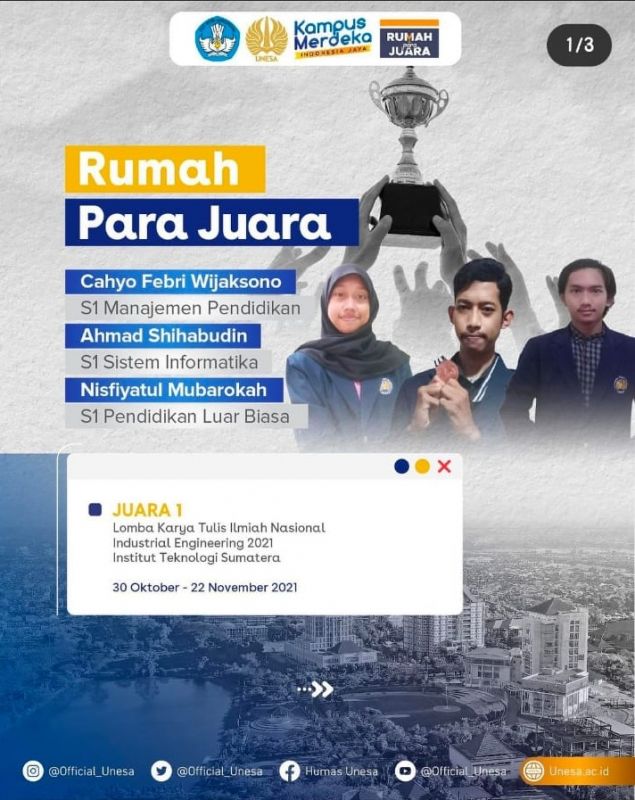
Unesa.ac.id, SURABAYA-Online learning is a great breakthrough in the world of education. However, not all learning, especially the practical ones, can be online. Such as learning Biology (practical material) for example, which since the beginning of the implementation of distance learning (PJJ) in Indonesia has experienced obstacles.
So that Biology practice can still be carried out in online mode, three students from the State University of Surabaya (UNESA) initiated a virtual laboratory learning media for Biology lessons some time ago. An alternative virtual lab when the physical lab cannot be used is developed in the form of mobile apps.
The learning media, named Virtolabo, was born from the hands of Cahyo Febri Wijaksono from the Department of Education Management, Ahmad Shihabudin from the Department of Informatics Engineering, and Nisfiyatul Mubarokah from the Department of Special Education. Their innovation turned out to be the 1st place in the Helicopter View Industrial National Scientific Writing Competition (LKTIN) at the Sumatra Institute of Technology (Itera) some time ago.
Cahyo Febri Wijaksono, the head of the innovation team, stated that the application was dedicated to assisting teachers and students in learning or studying Biology. "We think learning will be more fun because Virtolabo users can feel the sensation of being in a real laboratory (360 degrees)," he said.
The virtual lab application is equipped with several features, including user accounts, home pages, synopsis pages, material concept maps, reading booths, and V-laboratory. "The features contained in the Virtolabo application are not only to support learning, but are equipped with a display design with an educational theme that has been adjusted so that users do not get bored," he explained.
Shihab, a member of the team, explained the contents on the home page feature that students can search for and choose the material they want to study including the structure and function of plants, the human digestive system, the human circulatory system, the human respiratory system, the human excretory system, the human reproductive system, and reproductive materials. in animals and plants.
To make it easier for students to know what will be studied in the future. Students can read the material in the reading booth feature. Do not forget that users are required to log in and access Virtolabo on the login feature. V-laboratory is the last feature used to access animations about material objects in 360 degrees using augmented reality (AR) technology.
“Students can practice surgery, watch simulations, and interact with animations using various laboratory equipment through available objects. In addition to AR, there is a virtual reality (VR) button that functions to carry out Virtual Reality-based practices so that the implementation is real time, "he explained.
There are several tips that Cahyo and two of his colleagues did so that their innovations can win the national level competition. 1) writing scientific papers according to scientific rules means writing all forms of data then all forms of statements must be accounted for through clear sources and references. 2) use relationships to consult and ask for advice or motivation and support.
And, 3) more exercise. The more practice of course the better. Flying hours are the key in winning the competition. “Keep practicing, be consistent, keep the spirit. If you fail, get up again and keep getting up. Basically we do not compete with others, but with ourselves. Our quality today must be better than our quality yesterday. That's a real achievement, winning from other people is just a bonus," he said. [UNESA PR]
Author: Esti
Editor: @zam*
Share It On:






